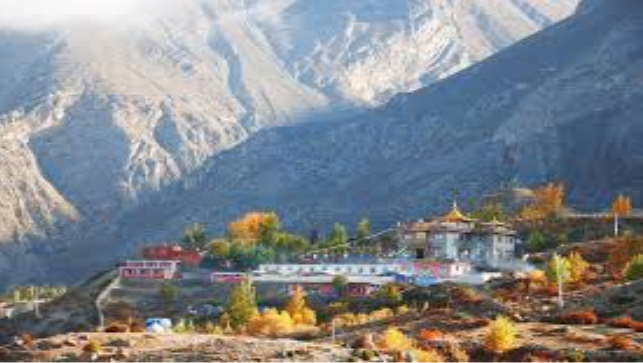Nestled in the heart of the Himalayas, the Lower Mustang Trek is a hidden gem, offering travelers a chance to explore a region rich in culture, history, and natural beauty. This moderate trek takes you through diverse landscapes, from lush forests to arid deserts, all while providing breathtaking views of snow-capped peaks like Annapurna, Dhaulagiri, and Machapuchare. What makes this trek unique is its deep connection to the ancient kingdom of Mustang, a former Tibetan Buddhist kingdom that has maintained its traditional ways of life.
In this article, we will dive into everything you need to know about the Lower Mustang Trek, from the best time to go to what you can expect along the way. Whether you are a seasoned trekker or a beginner, this journey will surely leave a lasting impression.
What is the Lower Mustang Trek?
The Lower Mustang Trek is a journey through the lower part of the Mustang region, a culturally and geographically distinct area in Nepal. Situated north of the Annapurna region, Lower Mustang is known for its striking desert landscapes, ancient monasteries, and traditional Tibetan culture. Unlike other more famous treks in Nepal, such as the Everest or Annapurna Circuits, Lower Mustang remains relatively off-the-beaten-path, offering an authentic experience.
The trek typically starts from the town of Pokhara, one of Nepal’s most popular tourist hubs. From here, trekkers travel to the town of Jomsom, which serves as the gateway to the Mustang region. The route then continues to Kagbeni, a small village that marks the boundary between the lower and upper parts of Mustang, before heading further into the region, passing through charming villages like Marpha and Tukuche.
Highlights of the Lower Mustang Trek
- Scenic Beauty and Diverse Landscapes
Lower Mustang is a place of contrasts. The lush greenery of the lower foothills soon gives way to the stark, desert-like terrain of the upper valley. As you trek through the region, you will experience various ecosystems, from sub-tropical forests to high-altitude deserts. This ever-changing landscape provides trekkers with unparalleled views of snow-capped peaks, including the mighty Annapurna and Dhaulagiri mountain ranges.
- Ancient Tibetan Culture
One of the most fascinating aspects of the Lower Mustang Trek is the opportunity to experience the ancient Tibetan culture that permeates the region. Mustang was once a kingdom in its own right, and many of its customs, traditions, and even the architecture remain distinctly Tibetan. The region is home to numerous monasteries, stupas, and prayer wheels, many of which date back centuries. The people of Mustang continue to practice Tibetan Buddhism, and you can witness their daily rituals, such as spinning prayer wheels and offering prayers at temples.
- Kagbeni: The Gateway to Mustang
Kagbeni is a beautiful village that lies at the confluence of the Jhong and Kali Gandaki rivers. Known as the gateway to Upper Mustang, Kagbeni is an important stop on the Lower Mustang Trek. The village is home to ancient red-painted houses, narrow alleys, and a traditional Tibetan monastery that offers a glimpse into the spiritual life of the locals. It is said that once you cross Kagbeni, you enter a region where no one has ever experienced a foreigner’s gaze.
- Ancient Monasteries and Cultural Immersion
Throughout the trek, you’ll encounter a series of monasteries, which serve as spiritual centers for the people of Mustang. These include the monastery in the town of Jomsom, as well as the notable Tukuche Monastery. Many of these monasteries house precious relics and murals that depict Buddhist deities and teachings, and some are even still used for meditation and spiritual practices. Visiting these monasteries gives trekkers a chance to understand the deep-rooted Buddhist culture of the region.
- Views of Majestic Peaks
The trek offers some of the best views of the Annapurna and Dhaulagiri mountain ranges. On a clear day, you can enjoy panoramic views of these towering peaks, which create a stunning backdrop as you trek through the barren landscapes of Lower Mustang. The contrast between the snow-covered peaks and the arid terrain is nothing short of mesmerizing.
The Trekking Experience: What to Expect
The Lower Mustang Trek is a moderate trek, ideal for trekkers with a basic level of fitness. The route is relatively straightforward, with daily hikes ranging from 4 to 8 hours. The terrain varies from easy walking paths in the lower parts to more rugged, rocky trails in the upper sections.
Day 1: Pokhara to Jomsom
The journey begins with a flight from Pokhara to Jomsom, a small town situated at an altitude of 2,700 meters. The flight offers a beautiful aerial view of the mountains, setting the tone for the adventure ahead. Once in Jomsom, you’ll have time to explore the town and its surrounding areas, before beginning your trek to Kagbeni.
Day 2-3: Jomsom to Kagbeni
The trek from Jomsom to Kagbeni takes you along the Kali Gandaki River. As you walk, you’ll pass through a series of small villages, with a stop in the village of Eklebatti. The route offers beautiful views of Dhaulagiri and Annapurna. Kagbeni is a beautiful village and an important cultural and spiritual stop for trekkers.
Day 4-5: Kagbeni to Marpha and Tukuche
After Kagbeni, you’ll continue your trek toward the villages of Marpha and Tukuche. Marpha is known as the “apple capital” of the region, where you can taste delicious local apples and apple products. The trek between these villages offers stunning views of the Dhaulagiri range and a chance to interact with the locals, who maintain their traditional Tibetan ways of life.
Day 6: Tukuche to Jomsom
On the final day of the trek, you’ll retrace your steps back to Jomsom. This is a relatively easy day, and you can reflect on the incredible journey you’ve had through this ancient land.
Best Time to Trek Lower Mustang
The best time to trek the Lower Mustang is during the spring (March to May) and autumn (September to November) months. During these times, the weather is generally clear and dry, offering optimal conditions for trekking. The spring season also sees the blooming of wildflowers, adding color to the landscape, while the autumn months offer clear skies and perfect views of the snow-capped peaks.
Winter treks can be difficult due to the cold temperatures and snow, and the summer months may bring heavy rains that can make trekking challenging. Therefore, spring and autumn are considered the best times to visit Lower Mustang.
Permits and Practical Considerations
To trek in the Mustang region, you’ll need to obtain two permits: the Annapurna Conservation Area Permit (ACAP) and the Mustang Restricted Area Permit. The latter can only be obtained through a licensed trekking agency in Nepal, as the region is a restricted area for foreign nationals. The permits help preserve the natural and cultural heritage of the region while regulating the number of trekkers.
The trek is considered moderate, but it’s important to acclimatize properly due to the altitude. The highest point on the Lower Mustang Trek is around 3,800 meters, so it’s essential to take your time and drink plenty of water to avoid altitude sickness.
Conclusion
The Lower Mustang Trek is one of Nepal’s most unique and culturally rich trekking experiences. It combines breathtaking landscapes, stunning mountain views, and an intimate look at a traditional Tibetan culture that remains largely untouched by modernity. The trek is a perfect choice for those looking for an adventure off the beaten path, with a chance to explore ancient monasteries, interact with the locals, and experience the beauty of Nepal’s Himalayas in a truly authentic way.
Whether you’re drawn to the spiritual atmosphere, the rugged beauty, or the adventure of the trek itself, Lower Mustang promises a journey that will stay with you long after you return home. If you’re looking for a trekking experience that combines natural beauty with cultural immersion, the Lower Mustang Trek should be at the top of your list.

